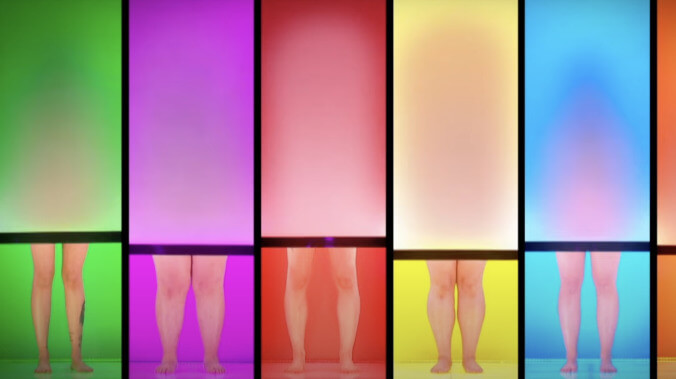Is Naked Attraction empowering its contestants—or just its audience?
Controversial, all-nude dating show Naked Attraction is currently one of the most popular titles on Max

Even in a reality TV landscape that includes MILFs dating each other’s sons and The Bachelor but old, some concepts still have the power to cause genuine shock and awe. Imagine a dating show where a single person chooses between six potential suitors based only on what’s revealed behind an incrementally raised panel. Sounds a little derivative? How’s this: those six suitors are completely, 100% butt-naked in a way that makes Game Of Thrones look like a church picnic. Not just that—they’re real humans going by their (presumably) real names, who’ve willingly volunteered to be judged only on their genitalia and naked bodies. On television! But it’s okay. This nudity isn’t pornographic; in fact, it’s empowering.
At least according to Darrell Olsen, the executive producer of Naked Attraction, the infamous U.K.-based dating show that immediately attracted a lot of eyes in the U.S. when it arrived on Max in late September. The premise is simple: you’re probably going to see your date naked at some point anyway, so why not get it out of the way first? A “picker” is thus shown an increasing portion of their prospective dates’ bodies, from their genitals up, and whittles the group down one by one as the episode goes on.
“What would happen if we were stripped of all the things that usually define us?” an intro voiceover asks, before explaining that the competition is “going back to basics.” In a further gesture of something close to wholesomeness, shots of penises and vaginas are interspersed with little animations explaining pleasure, attraction, and other sex-ed topics that dilute the onslaught of shock.
Despite any controversy, Olsen stands behind the mission statement of his show. “What it proves is that every person is different, and not just facially. We’ve all got different genitals. We’ve all got different big toes. It’s amazing. So there’s no reason to feel bad about yourself, and it’s empowering to see we’re all different,” he told The Hollywood Reporter. “We don’t play into the stereotypes. You might have a male with rather large genitalia and the Picker might say, ‘I don’t really like that, it’s not my thing.’ Or someone might say, ‘I like smaller boobs.’ The irony of the show is, by having a load of people naked, it makes you feel better about yourself.”
Whether it’s making people feel better about themselves or not, it’s certainly been a hit and generated a lot of attention. Just days after six seasons of the 2016 series were added to Max, it hit number one on the streamer. Per Parrot Analytics, the demand is currently 8.1 times higher than that of the average U.S. show, putting it on par with more mainstream hits like Insecure, per Men’s Journal. Ben Shapiro hates it. The View loves it. It’s been praised for its body diversity and derided as exploitative and crass. British people are tickled that Americans have never heard of it, and Americans are shocked in general. Wherever you fall on that spectrum, it’s hard to deny that this is a new frontier—at least in the states—for reality television, and maybe television in general.
“Love Island is a fantastic show, but the cast looks amazing and then viewers feel a little bit bad about the way they look,” Olsen added. “We’re the complete opposite.”
So what do you actually get by being on Naked Attraction?
This thinly veiled knock on the looks of Olsen’s own brave participants is certainly a little weird. In fact, while he goes into detail about creating a comfortable environment (requiring contestants to strip in their audition to assess their comfort before they get put in front of a camera, not keeping it too cold, creating a “party atmosphere”) and how inspiring all of this is for viewers, he never really expounds on what the actual participants are getting out of it, other than the chance to maybe go on a date.
He did clarify that casting is, unsurprisingly, a “tough job,” and that the people coming on the show definitely aren’t all exhibitionists or “massive extroverts.” “Some of the people are quite shy,” he said. “It’s just about finding people who have enough body confidence to come on the show.”
That injection of confidence must be really valuable because—sans date—it’s actually all anyone’s getting. “You don’t get paid if you’re on the show,” a former contestant revealed to British magazine Grazia earlier this month. However, they do get compensation for expenses and time off work, and, somewhat bizarrely, contestants are also paid an additional £75 when they’re kept on standby and don’t appear in one of the pods. “I got almost £500, but I only really wanted to go on it for the experience,” another contestant shared.
Now, all of these people have worn their birthday suits across multiple years and at least two continents. This seems a little like textbook exploitation; it’s hard to say whether every participant thought they were consenting to their image appearing in a completely new market, and the issue of residuals is something that writers and actors have spent a large portion of 2023 striking for. However, the formula clearly works for some people, if the show’s enduring success is anything to go by. “It’s very liberating,” another former contestant told The Sun. “A great experience.”